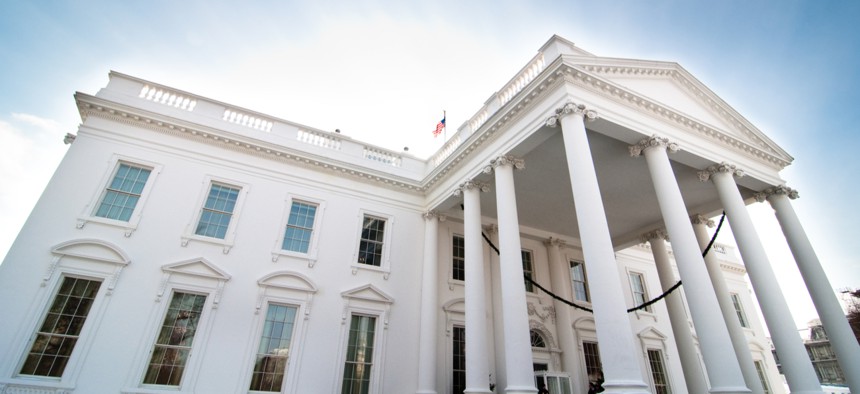
Shutterstock.com
Trump Administration Redacts Meeting Minutes on the Presidential Transition
“If there’s anything that needs to be redacted that’s a sign that there’s something that shouldn’t be going on,” said New York University’s Paul Light.
The Trump administration has redacted the meeting minutes pertaining to its presidential transition activities, which are required by law, raising concerns from former officials and experts.
As the November election approaches, the Trump administration must adhere to various legal requirements to ensure a smooth and peaceful transition of power if the president is not reelected. Under the 2015 Presidential Transitions Improvement Act, which amended the 1963 Presidential Transition Act, the president must establish a White House coordinating committee and council of agency transition directors six months prior to the election. In its guidance in April on how agencies should be preparing, the Office of Management and Budget noted that the latter council would meet on May 27. On June 17, Government Executive submitted a request for the meeting minutes to OMB and the General Services Administration under the Freedom of Information Act and on Friday received a response from GSA that was almost entirely redacted (OMB acknowledged the request but did not respond). The text under sections titled “Key discussion items from the meeting” and “Key action items from the meeting” was completely blacked out.
The General Services Administration FOIA office said portions were redacted that “reflect the agency’s deliberative process [that] are considered pre-decisional in nature and/or attorney-client privileged communications” as well as an “email address [that] would constitute a clearly unwarranted invasion of the council’s privacy.”
Meanwhile former officials and transition experts were confused and surprised to hear that such redactions would be made. This comes after various news reports and books documented the incoming Trump administration’s limited attempts to have a proper handover from the Obama administration in late 2016 and early 2017.
Paul Light, the Paulette Goddard Professor of Public Service at New York University, said, “it’s shocking” there would be so many redactions. It’s a departure from “the spirit as well as the substance of the Presidential Transitions Act to redact anything,” he told Government Executive on Tuesday. “If there’s anything that needs to be redacted that’s a sign that there’s something that shouldn’t be going on. This should be an open and fully transparent process.”
While there could be some confidentiality issues––such as giving specific names from the campaign of assumed Democratic nominee former Vice President Joe Biden––“it seems to me that GSA could have easily cured that problem by redacting a specific name … there’s no reason to redact much beyond those very obvious items,” he said.
Similarly, Robert Shea, a principal at Grant Thornton Public Sector and former senior OMB official, was surprised.
“I can’t see anything … that’s not in the public interest and that’s worthy of redacting,” he told Government Executive on Monday. “I’m trying to rack my brain as to what would be so secretive that redactions were required. The members of that meeting ought to be public, the general planning on what’s allowed and what’s required under the new law shouldn't be confidential in my view. So yeah, it does surprise me.”
Martha Joynt Kumar, director of the White House Transition Project, a nonpartisan nonprofit group that provides informational resources for government officials, said these meetings are important because “you learn who’s involved and what kinds of preparations they are making and, often, comparisons to the kinds they’ve done in the past.”
“I don’t know that there are compelling reasons why they shouldn’t become public,” Kumar said.
Government Executive appealed the FOIA request. When asked for comment about the May 27 meeting, GSA deferred to OMB; OMB did not respond to Government Executive’s request for comment by publication time.
Although the first transition law was passed in 1963, “the Bush administration really established [a gold standard for transitions out in 2008]” after the 2000 election, said David Marchick, director of the nonprofit Partnership for Public Service’s presidential transition center. This was because “the Clinton handover was not perfect” as a result of the disputed election and shortened transition period.
While the 2010 Pre-Election Presidential Transition Act recommended the creation of the two councils, the 2015 law mandated it. Therefore “this is the first time that we have this kind of formal structure that takes place not at the end of an administration, but at the end of a first term,” Kumar noted. “Setting up these counsels” can be a “touchy” situation for a president because it “gives the impression that he thinks he’s going to lose and no president wants to do that.”
As this transition is happening amid the pandemic, Marchick said he’s “been very impressed” as he sees the Trump administration, federal agencies and the Biden campaign all “taking it very seriously.” As required by law, the administration submitted its report on transition plans to Congress six months ahead of the election in May. The next report is due on August 3, three months before Election Day.
The story and headline were updated to clarify the administration's response to Government Executive's request for information under the Freedom of Information Act. The General Services Administration provided the redacted meeting minutes, not OMB. OMB did not respond to the FOIA request.







